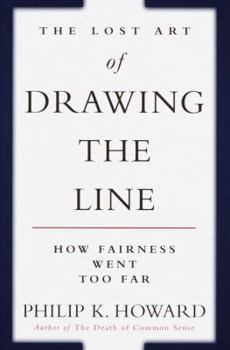The Lost Art of Drawing the Line: How the Common Good Collapses When No One is in Charge
The Lost Art of Drawing the Linewill appall and irritate - and entertain - readers every bit as much as Philip Howard's first book. Why is it that no one can fix the schools? Why do ordinary... This description may be from another edition of this product.
Format:Hardcover
Language:English
ISBN:0375504222
ISBN13:9780375504228
Release Date:April 2001
Publisher:Random House (NY)
Length:272 Pages
Weight:1.00 lbs.
Dimensions:1.0" x 5.9" x 8.6"
Customer Reviews
4 ratings
A book that will really make you think
Published by Thriftbooks.com User , 20 years ago
As an immigrant to the US (from Mexico), one of the hardest things for me to get used to was the skewed sense of freedom and entitlement that is sometimes expressed in this country. On my own I had been trying to come to grips with the ideas of extreme lawsuits, political correctness, and limits on authority. While I'm in favor of the basic ideas expressed in all these principles, I constantly get a feeling that many people don't understand the true meaning of their rights and simply abused their privileges. This book validated my beliefs, but more importantly, helped me to better understand how we have come to act this way. It also helped me express all my feelings about this subject in a simple way: Our over emphasis on our individual freedoms and (supposed) entitlements is putting in jeopardy our common good, and we are ultimately hurting ourselves. I think this book should be read by anyone who wants to be a true contributor to the common good.
Gets to the core of what's wrong with our legal system
Published by Thriftbooks.com User , 22 years ago
This book is much more than just a call for tort reform. Anyone can say that our society has become overly litigious but Howard goes a step beyond. The Lost art of Drawing the Line presents the full picture of what is wrong with our legal system, how it got that way and what we can do to fix it.Howard traces the roots of our current legal problems back to the late 19th Century when the political spoils system was replaced with an impartial legal and bureaucratic approach. By replacing politics with a system of rules it was hoped that governmental dealings would be fairer. As anyone who has ever had to deal, or much worse work, with the stifling bureaucracy that grew out of this movement knows it is clear that somewhere along the way fairness went too far.Howard uncovers the paradox of how our quest for individual rights has actually resulted in a diminution of our freedom. True, we can still do what ever we want by ourselves but we must walk on eggshells when dealing in groups, afraid to offend lest someone take us to court. Howard bravely goes one step further and examines the detrimental effects that the law has had on race relations. He notes that the ticking bomb of the race card has created a minefield of fear and bitterness in the modern workplace.Whether intentional or not, The Lost Art of Drawing the Line serves as an excellent companion book to Robert Putnam's Bowling Alone. By getting to the core of why coming together to work for the common good has become such a risky proposition The Lost Art of Drawing the Line answers the question of why one would choose to bowl alone.The book is not all doom and gloom. We still have a government of the people. And, as Howard proposes, if as a nation we are able to gather the national will to fix our system, no government can get in our way.Read this book. And then recommend it to your friends.
Superb.
Published by Thriftbooks.com User , 23 years ago
Aside from what I considered to be a weak title, everything else about the book was superlative and highly thought-provoking. It is obvious when when people were spreading the gospel of individual rights through our society, no one stopped to realize that the random and haphazard exercise of one person's individual rights often ran in direct contradiction to society's rights as a whole. As Mr. Howard says about juries for example: They are not thinking about the effect of their decision on society; they are merely thinking about the two litigants whose case they have been asked to decide. The problems created by this phenomenon are particularly evident when it comes to puntive damages. When plaintiff's lawyers urge jurors to "teach this company a lesson for their [supposedly] heinous conduct" the jurors can respond by blithely awarding tens or even hundreds of millions of dollars in punitive damages, and go to bed at night feeling that they have "served" society by their actions. And of course the great irony is that they have accomplished the exact opposite result. I don't know how much of an effect Mr. Howard's book will have. While it may not be readily apparent, the interest groups that have no interest whatsoever in adopting his suggestions--e.g. the American Bar Association, unions of all stripes and colors, libertarians (ironically) and even Congress to some extent--will act to make sure that the status quo remains the status quo. Nevertheless, I would be delighted to see all of America take his message to heart.
a must-read for all teachers
Published by Thriftbooks.com User , 23 years ago
In my eight years of teaching high-school, I have encountered many situations where schools have made nonsensical decisions because they feared a lawsuit. Howard's book is surprisingly clear on the reasons why this happens, and how this atmosphere of "rights" has simultaneously made any expectation of decency in behavior impossible. Thanks for a clear and hard-hitting analysis of the insanity of the educational establishment.





